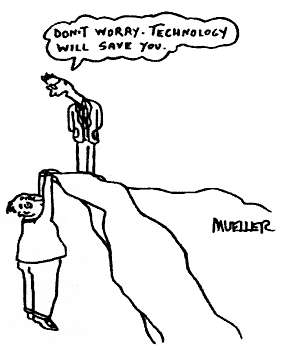The Silent Treatment--And Other Ways Not to Handle Your Problems Well

It's a fascinating fact that these days we have more ways of communicating then ever before, and yet we have not made any social advancements in handling problems of communication. For all of our technology, important social relationships--friendships, marriages, employer relations, and family relations are not improving as a whole. In the health care system, we've learned that the number one cause for preventable death in the hospital is poor, or under-communicating. Poor communication replaced medication errors as the leading cause of preventable death in the hospital, and THAT number is already something close to 200,000 per year in the US alone. Think about this. Hundreds of thousands of people could literally have their lives saved with the right conversation. What are we doing wrong?
Towards the end of 2009 I joined Facebook, after avoiding all social networking for years. It wasn't a deliberate avoidance. I just didn't think I had time for it, as I had enough trouble keeping up with my friends in our actual lives. I proclaimed time and again that social-networking was just "not me." And really it wasn't. I'm still one for old-fashioned conversation. Facebook tells me I have something to the tune of 250 friends, but I don't believe him. Most of my friends are not on Facebook for one, and of that number of 250 friends on Facebook, I probably regularly see about 50 to 60 people. That's already more than I can handle. But like most who join Facebook, I became completely addicted to it. It was a wonderful way to talk, without actually communicating. There's no real listening involved, no real conflict resolution, very little musing over the deeper concepts of life. I notice most are eager to let the internet know what they're going to wear that day, that they went on a bad date, that the mall is crowded or the line they're in is too long. When 'status updates,' and I just learned to call them that, slow to a halt, those you know on Facebook assume that clearly your heart has done the same. Who wouldn't be updating their status unless they're dead?
I've heard grown adults in their thirties recently talking about how they had to "de-friend" a person off Facebook because of something that had offended them at a barbeque. One de-friendship I knew occurred over a misunderstanding of the "tone" of a status update made by a Facebook friend. Now, I'm not the most mature person in the world, but the last time I de-friended someone it was over a peanut butter sandwich, and a Punky Brewster lunch box. What has happened to our ability to resolve our problems within our own social communities?
And if you're not Facebooking, there's always text messaging. I'm the reigning queen of texting, a culprit that has dumbed down conversation to virtually the point of babbling. I send and receive texts that are so abbreviated that out loud it would sound as if we were speaking infant. And yet, I love texting for all the ways it bottom lines a thing. No conversation frills, just...OMW. (On my way).
Our technology has made poor communication funny--our ability to misunderstand each other has become entertainment. If you're not truly witty, charming or interesting in real life, you can post enough interesting links to defy that. If you're not wise to what's going on in the world, you can just refrain from commenting and your ignorance can be your own little secret. Actual conversing is almost out-dated, and it's all fun and games--until someone gets hurt.
Enter The Joint Commission. This is one of the regulatory agencies in the hospital system--in fact it's the regulartory agency. If the FBI were to morph with say, your mother-in-law, and formed an agency, they'd call themselves, "The Joint Commission." In health care we prepare all year for their annual "visit" and know that if we don't pass, heads will roll. The Joint Commission can close a hospital's doors in 30 days time. This agency promotes "gentle" goals that we are to "gently" adhere to or we will be "gently" fined. They're like gentle Nazis. When The Joint Commission declared the news that poor communication was the number one killer in the US health care system, it made an impact on me. Some of our regressing social behavior is carrying over in to things grown-ups must handle well. Our health care, the government, our families.
I don't have the luxury of "de-friending" a doctor or nurse that's getting on my nerves. (I certainly would if I could). We have to work it out. We have to remember we are on the same side, work together, and not communicate in fragments. We have to not text. If a physician wants something done a certain way, she has to say what she means, and I have to understand what she means before I go to carry it out. If I don't agree with the decision, or find it to be dangerous, I can not handle it by not speaking to her for the day. I can't handle it by screaming at the top of my lungs, or resorting to insults. Neither can she.
At a conference I went to in Vegas a while back, the speaker recommended a book, that I still haven't read completely, but I've appreciated thus far. The speaker stated that if we got the book, "Crucial Conversations," and learned nothing that helped us improve in how we interacted as professionals, or even in our families, that she would refund the book out of her own pocket if we sent her the receipt from wherever we got the book. One of the key components of the book that I've found was the resurrection of the lost art of listening well. My best mentors as nurses were very effective listeners. They demonstrated that they understood what was being said to them by both patients and doctors, and would not hesitate to seek clarity on what they didn't understand. They didn't worry about looking as if they were of less intelligence if they truly did not understand an order--a serious problem in health care as a whole. So many in health care are climbing the intelligence ladder at all times, and a question knocks them down a peg. But seasoned, and truly worthy doctors and nurses shrugged at the idea that one of their peers would judge them for gaining clarity on an issue on the floor.
I have to end this with where poor communication hits the hardest. The family--which is the basic unit of any society, is suffering tremendously from this very basic concept of not communicating effectively. The average US family just doesn't look right without something electronic stuck to every family member at nearly all times. With more ways to say hello then ever, family members barely want to. What contest do we ultimately win in society as a whole if we can't keep our families together? Can the I-Family survive?






